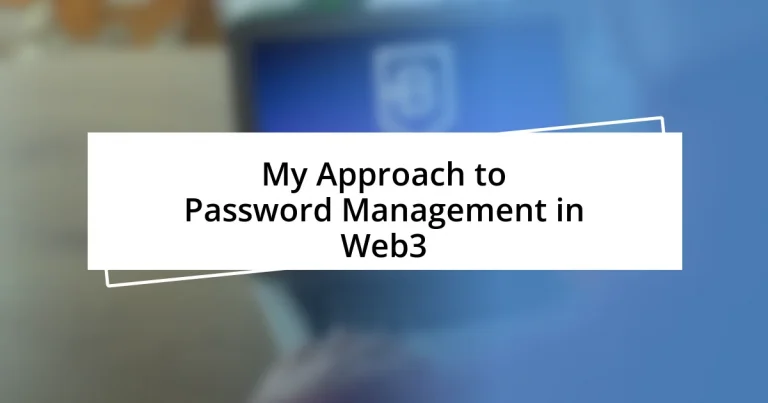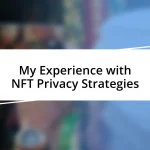Key takeaways:
- Password management in Web3 requires unique, complex passwords and proactive strategies to avoid loss of access and vulnerabilities.
- Utilizing password managers and enabling Multi-Factor Authentication (MFA) significantly enhances security, making it easier to manage multiple accounts.
- The future of password management may evolve towards biometrics and passwordless authentication, prioritizing both security and user experience.
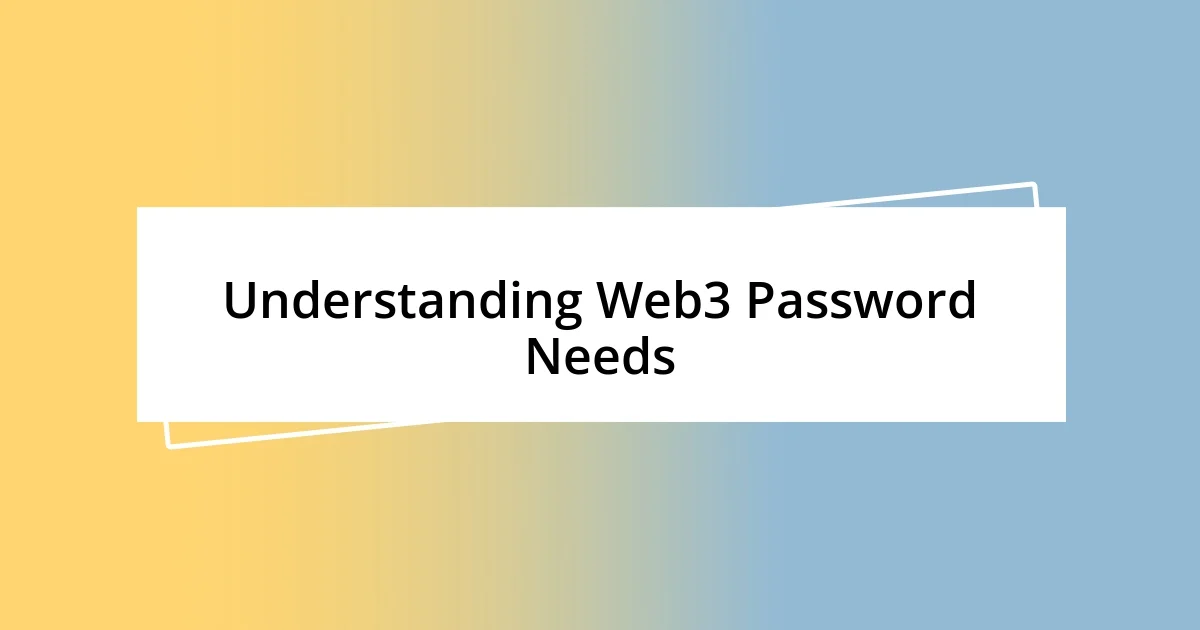
Understanding Web3 Password Needs
In the shifting landscape of Web3, password needs are evolving dramatically. I remember my first experience with a decentralized application where I felt a rush of excitement mixed with anxiety, realizing I was now responsible for my own security. Reflecting on that moment, I often ask myself: How can we create a balance between security and usability, especially when many users are new to this digital frontier?
One essential aspect of Web3 is the reliance on non-custodial wallets, which means users don’t have a centralized authority to turn to if things go wrong. I’ve seen friends and colleagues lose access to their assets simply due to poor password management. It makes me think — how can we educate ourselves to protect our holdings while still making the process user-friendly?
As I navigate various platforms, I’ve noticed that there’s a heightened need for intricate yet memorable passwords owing to the diverse services in Web3. It’s not just about complexity; it’s about creating a mental model for ourselves to manage these passwords effectively. Have you ever felt overwhelmed by the sheer number of accounts you need to keep track of? I certainly have, and I know that developing a personalized approach to password management is crucial in this decentralized space.
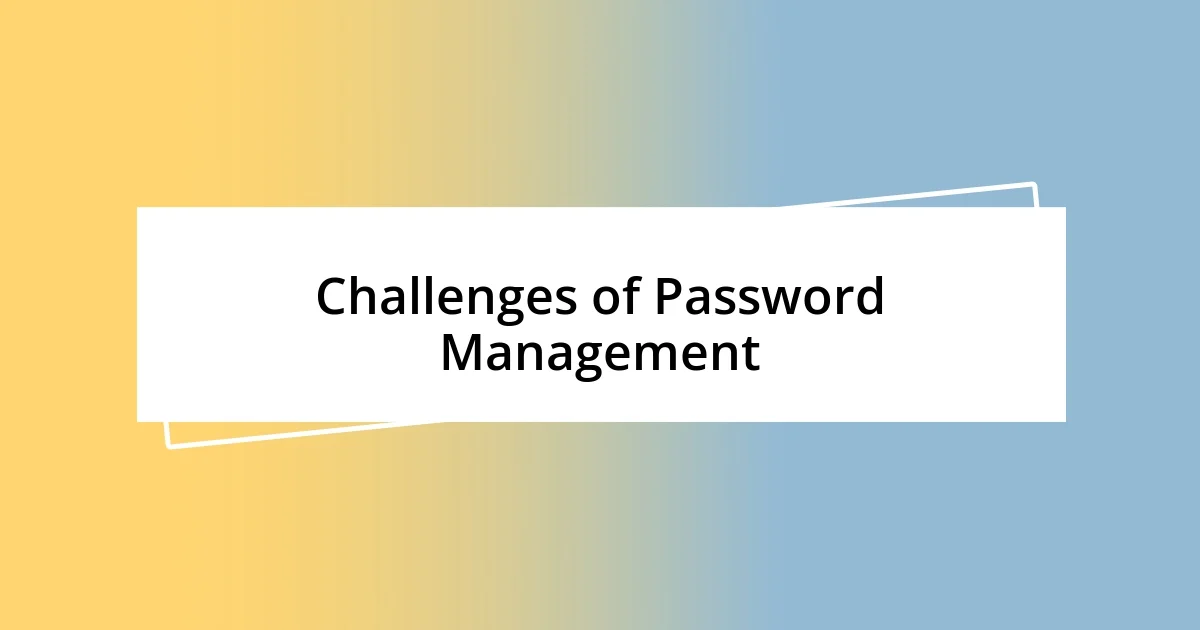
Challenges of Password Management
Password management in the Web3 landscape poses several challenges that can feel daunting, especially when I reflect on instances where I stumbled. One of the most pressing issues is the need for unique and complex passwords across multiple platforms. I remember setting up my first cryptocurrency wallet; I was so focused on mining that I nearly forgot my password—talk about panic! It’s a vivid reminder of how critical it is to establish a reliable system when managing access to one’s digital assets.
Here are some specific challenges in password management:
– Increased Complexity: The necessity for intricate passwords can lead to forgetfulness.
– Loss of Access: Forgetting a password could mean losing access to valuable assets with no recovery option.
– Human Error: Typographical mistakes can happen when logging in, leading to potential lockouts.
– Lack of Knowledge: Many users are unfamiliar with security best practices, which can exacerbate vulnerabilities.
– Inconsistent Display: Some platforms may present passwords oddly, creating confusion when trying to input them.
Navigating these challenges requires not just awareness but proactive strategies to safeguard our digital identities.
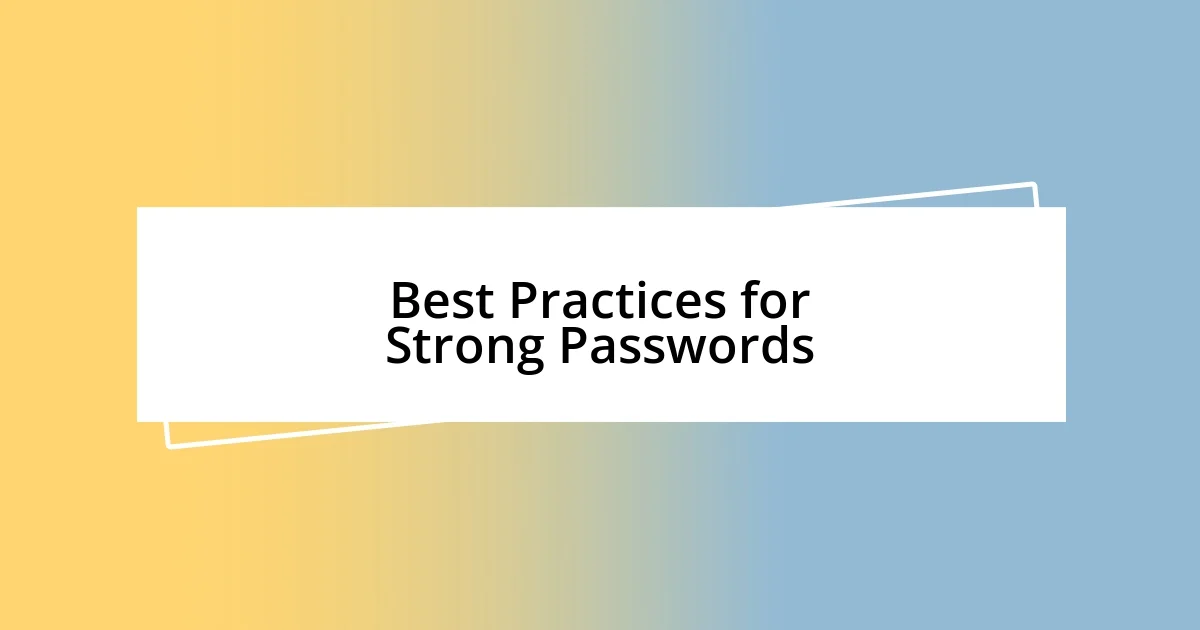
Best Practices for Strong Passwords
Creating strong passwords is essential in the Web3 world, where stakes can be incredibly high. I remember setting up my first account and feeling overwhelmed by the password requirements. It hit me how crucial it was to include a mix of letters, numbers, and symbols, which not only enhanced security but also kept my mind sharp in the process. Have you ever thought about how your passwords can be an extension of your digital identity? I find it empowering to personalize them while ensuring they are robust against potential threats.
One best practice that resonates with me is the use of passphrases instead of traditional passwords. When I switched to a memorable phrase, it drastically reduced the clutter in my mind. I could easily recall my password without sacrificing security—imagine combining a quirky line from your favorite song with random numbers. It’s a method that balances creativity and complexity effectively. It might seem simple, but that twist makes all the difference.
Additionally, I can’t stress enough the importance of using different passwords for each service. I once learned this lesson the hard way after a data breach exposed my details on one platform, and I found all my accounts compromised. That experience pushed me to adopt a password manager, which keeps everything organized and easily accessible. Have you tried a password manager yet? They can be game-changers for managing the multitude of accounts we have in this decentralized ecosystem.
| Best Practices | Description |
|---|---|
| Unique Passwords | Use a different password for each account to minimize risk. |
| Passphrases | Create long, memorable phrases that are hard to guess but easy to remember. |
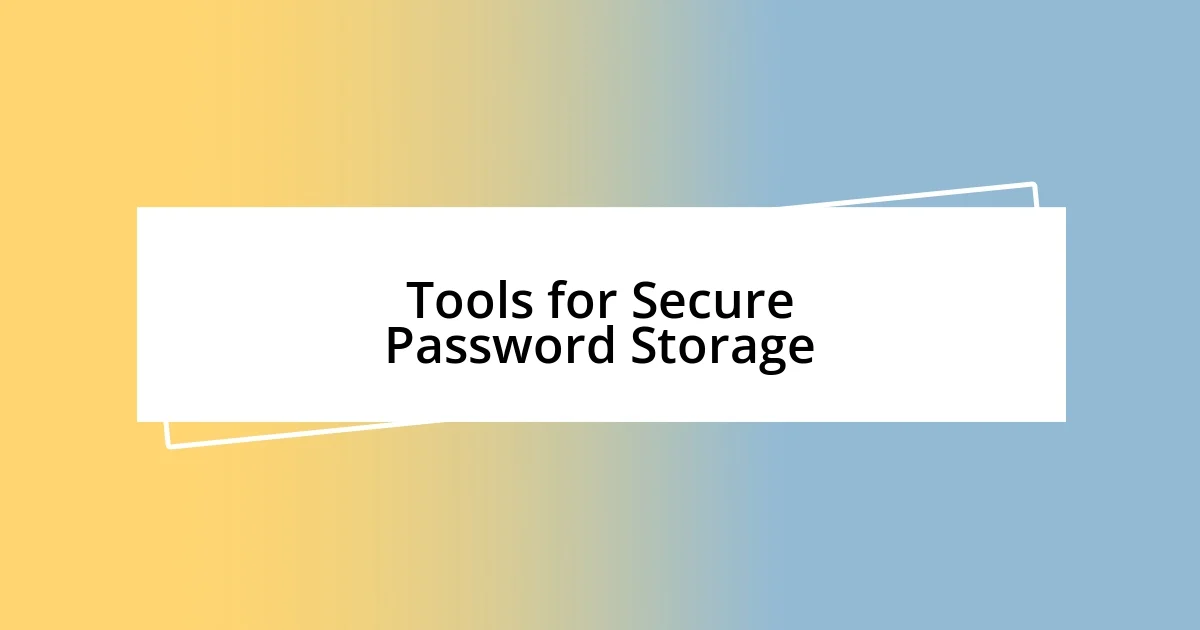
Tools for Secure Password Storage
Using a reputable password manager has truly transformed the way I handle my passwords. When I first started using one, I felt a weight lifted off my shoulders. I could finally have complex, unique passwords without needing to memorize them all. Hearing about someone leaving their digital assets in limbo due to forgetfulness is always a stark reminder to me of why these tools are essential.
Among the various tools I’ve explored, I’ve found software like LastPass and Bitwarden particularly beneficial. Both offer user-friendly interfaces that make organizing my multitude of accounts a breeze. Once, I spent a whole afternoon logging into different wallets and services, jotting down passwords on a sticky note—which was a recipe for disaster. If you have ever used a password manager, you know that exhilarating feeling of securely generating a password with just a click.
Taking things a step further, I also enable two-factor authentication (2FA) whenever possible. It’s like having a second lock on your door. I recall a moment when I received an unexpected authentication request on my phone—it was comforting to know that even if someone attempted to access my account, they would still need my authorization. How secure do you feel with your current setup? The combination of a password manager with 2FA creates a fortified digital environment that lets me sleep soundly at night.
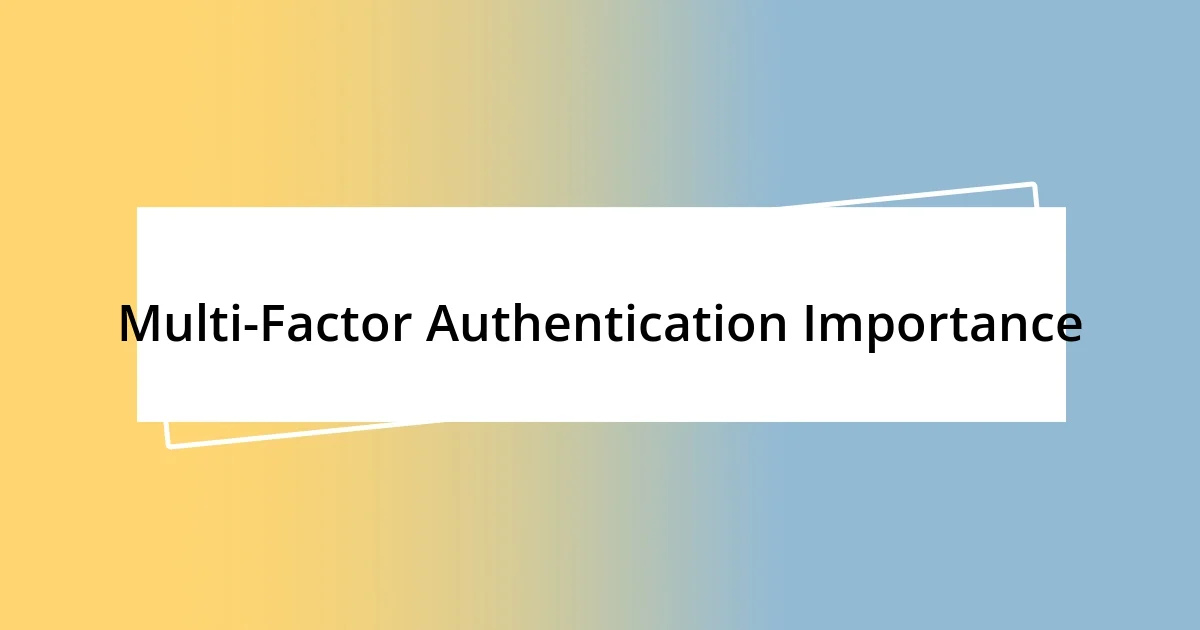
Multi-Factor Authentication Importance
Multi-Factor Authentication (MFA) is like having a bodyguard for your digital life. I remember the first time I set it up; I felt a surge of confidence knowing that even if someone guessed my password, they still wouldn’t get in. It was a small inconvenience to receive a code on my phone, but that extra step made all the difference in my peace of mind. Have you considered how much more secure your accounts could be with MFA?
I’ve encountered moments where MFA saved me from potential breaches. One evening, I received a notification for a login attempt from an unfamiliar device. My heart raced as I quickly checked the code on my phone; without MFA, my digital assets might have vanished in seconds. This experience reinforced how crucial it is to layer my security. It’s not just about having a strong password; it’s about ensuring that access to my accounts requires more than just that one piece of information.
In a decentralized world like Web3, where identity theft is all too common, I can’t emphasize enough the importance of MFA. It’s a straightforward way to make it exponentially harder for hackers to gain access. I still remember a friend who neglected this layer of security—it’s frightening to think how quickly their funds disappeared. If there’s anything I’ve learned, it’s that we often underestimate the value of taking those extra steps. What about you? Are you ready to embrace a more secure digital lifestyle?
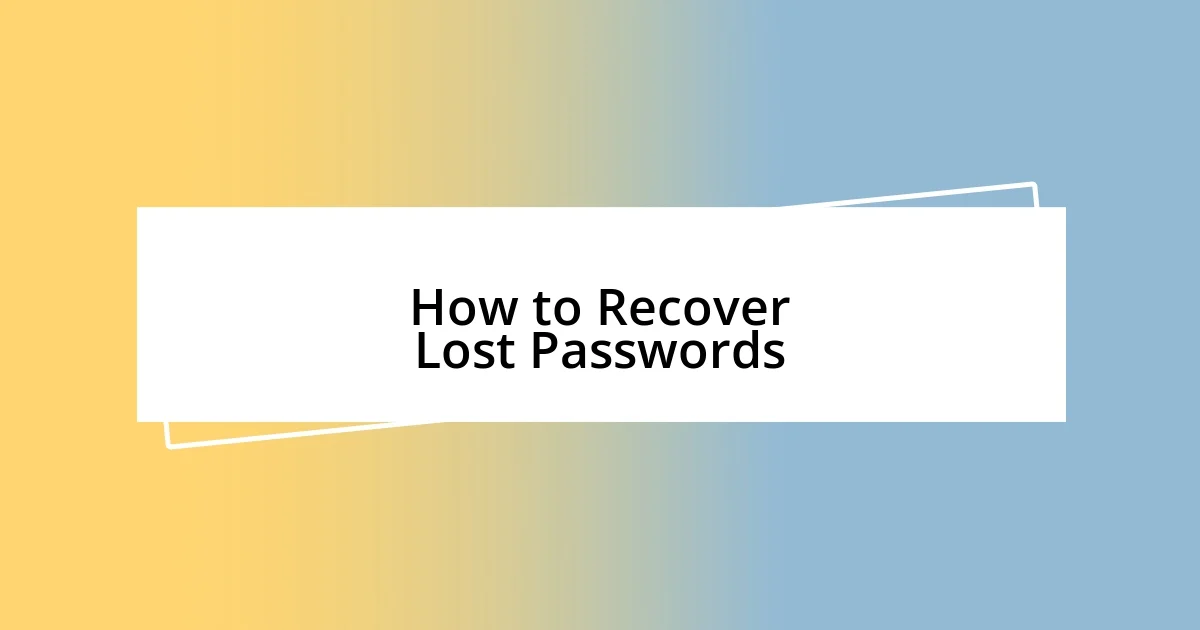
How to Recover Lost Passwords
Recovering lost passwords can feel daunting, but I’ve navigated this challenge a couple of times. One thing I’ve learned is the importance of backup recovery options, like recovery phrases or security questions. Just the other day, I found myself locked out of an account I rarely used, but thankfully, I remembered the recovery phrase I had written down in a secure place—what a relief that was!
When I forget a password and need to regain access, I often start with the email associated with the account. Most platforms send password reset links to that email. I can’t tell you how many times this simple step has saved me from a potential meltdown. If you’ve felt that moment of panic, you might understand the importance of keeping your recovery email secure and accessible.
In my experience, utilizing password managers not only makes account creation easier but also streamlines the recovery process. Once, I found out that my favorite service had experienced a data breach. Thanks to my password manager, I was immediately notified, allowing me to change my password quickly and secure my accounts. Have you ever had a similar experience where using the right tools made all the difference in your digital safety? Trust me, those moments reinforce the value of being proactive about password management!
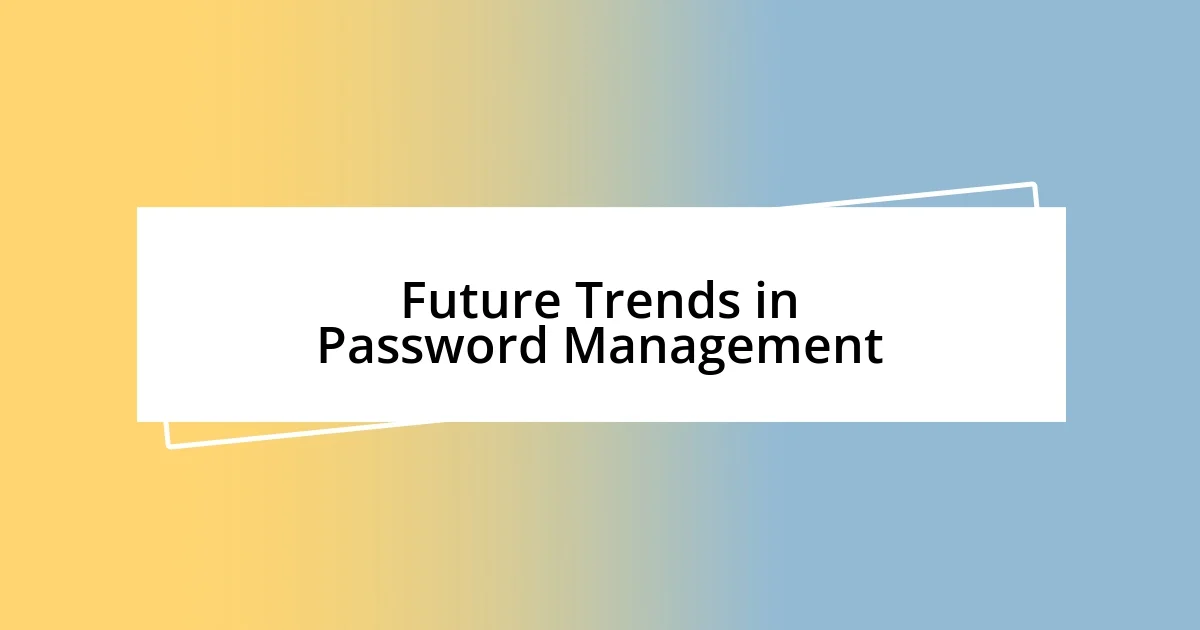
Future Trends in Password Management
The future of password management is shifting towards innovative solutions that prioritize security and user experience. I recently came across the concept of biometrics, like facial recognition and fingerprint scanning, which could provide a seamless way to access accounts. Imagine not having to remember an array of passwords; it feels liberating, doesn’t it?
In my journey through Web3, I’ve noticed a growing trend towards passwordless authentication. It’s fascinating how systems are leveraging technologies like blockchain to enhance identity verification. I remember a colleague mentioning how they used smart contracts to secure their digital assets without ever needing a password. This added another layer of security while simplifying the login process—a win-win in my book!
Moreover, as we venture into this decentralized future, I foresee an uptick in decentralized identity solutions. The idea of owning and controlling my digital identity resonates deeply with me. I can’t help but wonder—what if we could entirely eliminate the risks tied to centralized password databases? This shift could empower users while mitigating the chances of large-scale data breaches. How exciting would it be to have full control over our online identities?












